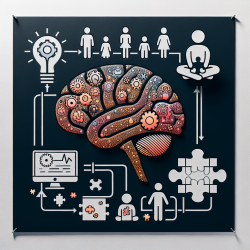The cerebellum has long been associated with motor control, but recent research has unveiled its significant role in cognitive and affective processes. The Cerebellar Cognitive Affective/Schmahmann Syndrome (CCAS) offers a fascinating insight into how cerebellar dysfunction can impact cognition and emotion. This blog post explores key findings from "The Cerebellar Cognitive Affective/Schmahmann Syndrome: a Task Force Paper," providing practical insights for practitioners looking to enhance their therapeutic skills.
Understanding CCAS: Beyond Motor Functions
The cerebellum's role extends beyond motor functions to include cognitive and affective domains. CCAS is characterized by deficits in executive function, visuospatial cognition, language, and emotional regulation. These deficits arise from disruptions in cerebellar pathways that connect with limbic circuitry and various cerebral cortices.
- Executive Function: Challenges in working memory, problem-solving, and multitasking.
- Visuospatial Cognition: Difficulties with spatial disintegration and simultanagnosia.
- Language: Issues such as agrammatism and mild anomia.
- Emotional Regulation: Flattening of affect or disinhibition.
The Dysmetria of Thought Hypothesis
The "dysmetria of thought" hypothesis suggests that the cerebellum applies a universal computation across multiple domains, impacting both motor and non-motor functions. Disruptions in these processes lead to impairments similar to motor coordination issues seen in ataxia. Understanding this hypothesis can help practitioners recognize the broader implications of cerebellar dysfunctions.
Implications for Therapy and Rehabilitation
The insights from CCAS research have profound implications for therapy and rehabilitation practices:
- Cognitive Rehabilitation: Tailored interventions focusing on specific cognitive deficits can improve outcomes for patients with cerebellar damage.
- Multimodal Approaches: Combining traditional motor rehabilitation with cognitive therapies can address the full spectrum of CCAS symptoms.
- Neuroimaging Techniques: Utilizing advanced imaging can help identify specific areas of dysfunction, guiding targeted therapeutic interventions.
The Call for Further Research
The task force paper emphasizes the need for continued research into the mechanisms by which the cerebellum influences cognition and affect. Practitioners are encouraged to contribute to this growing body of knowledge by exploring innovative therapeutic approaches and sharing their findings within the scientific community.
The Cerebellar Cognitive Affective/Schmahmann Syndrome: a Task Force Paper










